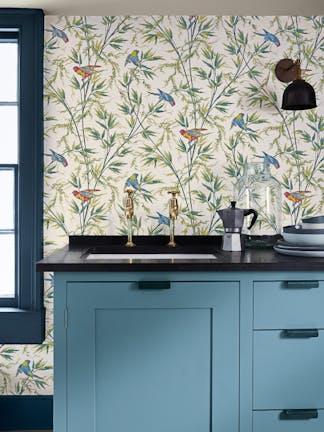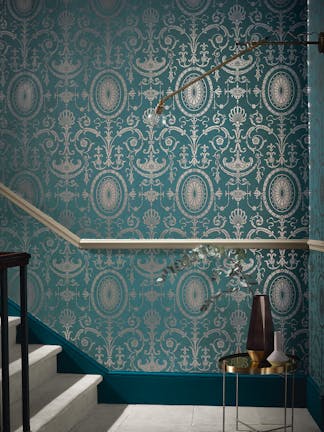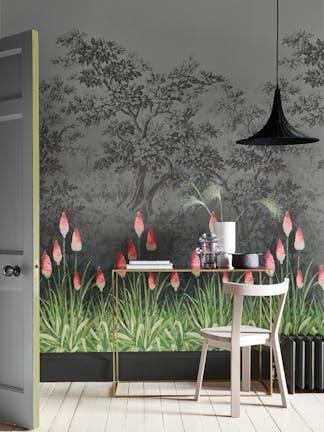London Wallpapers IV: archive chic for walls
With an established tradition for breathing new life into old designs, Little Greene has once again delved into the archives, scouring for historic designs that can be successfully adapted for 21st century interiors. The company’s most recent collection, London Wallpapers IV, is a glorious compendium of authentic motifs, rescaled and recoloured for contemporary living. The collection will be launched at Paris Déco-Off in January 2017.
The collection comprises twelve designs over 58 papers in an enticing palette of classic and contemporary colourways, enhanced with subtle printed textures. Five designs are drawn from existing Little Greene collections, and retain some of their original Little Greene colourways as well as new, updated tones; there are also seven unseen designs in a variety of delightful shades.
Spanning three centuries of British design, the original patterns can be dated back to the years between 1760 and 1950. Mostly manufactured in London to decorate smart city and country homes, each design has its own compelling provenance tracing it back to the original house in which it was discovered.

Albemarle St. (c.1760)
Reminiscent of Spitalfields silks, this paper, found in Albemarle Street, off Piccadilly, had an enormous pattern repeat of 6ft. Originally produced in a dark blue flock on a light ground, it was unusual to find so bold and expensive a paper used as here, in a low ceilinged, second floor bedroom. Such a grand paper would have been designed to have been on show – more often in a downstairs reception room where guests would be entertained. (two new colourways, three retained colourways)
Albemarle St. Astral & Albemarle St. Vapour
Browse Ablemarle St. Wallpaper
Bayham Abbey (c.1880)
Whilst the original fragment was discovered at Bayham Abbey, on the Sussex-Kent border, the paper is likely to have been produced in London. On a red ground, reminiscent of gothic style, the original paper was made from cellulose wood pulp and machine-printed. (two new colourways, four retained colourways).
Browse Bayham Abbey Wallpapers
Borough High St. (c.1880)
The property from which this design hails was built in the mid-19th century on the site of the infamous Marshalsea Prison, which for nearly 500 years was notorious for the incarceration of London’s debtors, including Charles Dickens’ father in 1824. The earliest paper retrieved from a laminate of four, this gothic trellis design with Moorish influences was the first paper to adorn the walls of one of the properties that replaced the prison in the late 1870s. (five colourways).
Browse Borough High St. Wallpapers
Broadwick St. (c.1775)
Found in a row of elegant early-18th century houses in Broadwick Street, Soho, this design is remarkable in that it was based on a botanically accurate reproduction of a plant, Clusia Rosea, first recorded in a famous book the Natural History of Carolina, Florida and the Bahama Islands by Robert Catesby in 1743. (two new colourways, two retained colourways)
Browse Broadwick St. Wallpapers
Chelsea Bridge (c.1850)
Stylistically this pattern is unmistakably French, but the archive piece, which has prescribed very little by way of redesign, came from a prestigious address near the Thames. The decorative stripe either side of the floral column is retained but reduced in weight to give a more balanced feel to the pattern when hung in repeat. (four colourways)
Browse Chelsea Bridge Wallpapers
Cranford (c.1765)
This mid-18th century paper, found in Cranford, Middlesex, has a yellow floral ogee motif printed on to thick, hand-made rag paper. It is unusual because yellow, although a popular colour, was expensive and prone to fading. It was manufactured using ‘slip-printing’, a technique to make the paper appear more expensive than it really was due to its ‘shadow’ effect, which was achieved economically by using the same block to print two different colours. (three retained colourways).
Browse Cranford St. Wallpapers
Great Ormond St. (c.1890)
A colourful parrot motif, closely based on one of a multi-layered group of papers removed from the ground floor rear closet of a very early-18th century terrace house opposite Great Ormond Street Children’s Hospital. This design was subsequently machine-made on cellulose paper in the late 19th century. (three new colourways, three retained colourways.)
Browse Great Ormond St. Wallpapers
Old Gloucester St. (c.1870)
Each inset panel within this design originally contained an ornate scene, a reflection of its origins in Bloomsbury, an affluent area with a rich history. Having removed any extraneous detail, what remains is an unrefined but elegant wood panel-effect trompe l’oeil that could be used all round a room in a traditional style, or to bring a timeless architectural feel to a single wall in a more contemporary interior. (three colourways)
Browse Old Gloucester St. Wallpapers
Palace Road (c.1895)
A typical historic damask, the design source was originally a woven silk from the 19th century, the effect of which is replicated in the print detail. Like the design High Street from London Wallpapers III, there are known examples of this pattern in more than one location, making it likely it was being produced in significant quantity from as early as the 18th century through to the late 19th: this is commensurate with the manufacturing capabilities of the industry at this time (eight colourways).
Browse Palace Road Wallpapers
Pall Mall (c.1950)
With its single print colour, this paper is a younger sister to the design Marlborough, but carries the same delicate elegance. Amazingly, both papers were recorded from the same property, Marlborough House overlooking St James’ Park. The date cites the likely origin of the paper used in Marlborough rather than the neoclassical roots of the design, which would be attributed to the architectural trend of the early-19th century (five colourways).
Browse Pall Mall Wallpapers
Richmond Green (c.1880)
Unbefitting to the quality of this 19th century paper, the surviving sample was retrieved, not from the walls of a smart Richmond townhouse, but from a skip outside it, during a 1989 refurbishment. A delicate tudor rose, the execution is typical of many designs produced in the style of William Morris in the late 19th century. Little Greene has printed it in two authentic Arts & Crafts colourways, three classic colourways and a modern metallic (six colourways).
Browse Richmond Green Wallpaper
Upper Brook St. (c.1920)
The design features brightly coloured kniphofia flowers, commonly known as torch lilies or red hot pokers (African in origin but named after German horticulturalist Johan Hieronymous Kniphof). They were recorded as having been hand-painted and stuck over a pre-hung wall covering in a late-18th century Upper Brook Street house as a bespoke decoration. To replicate a natural scene behind the pokers Little Greene has adapted
a motif from its Stag Toile paper. Supplied in a standard 10m roll, there are three drops, each 3.25m in height. The pokers repeat every drop but the full background scene is only completed when all three drops are hung (three colourways).
For ease of co-ordination, each wallpaper option is complemented by three judiciously selected shades from Little Greene’s current paint palette.
“We take our role as ‘custodians’ of these archive motifs very seriously: the original wallpaper fragments are treated with the reverence they deserve and we take huge pleasure and pride in bringing them to life again. Careful use of colour is key to creating a seamless and harmonious union of old with new. The resulting wallpapers can grace the walls of contemporary or traditional properties, used on one or all four walls, with effortless ease.”Managing Director, David Mottershead

